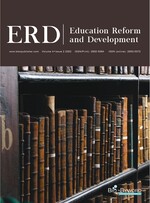Abstract
Postgraduate medical education is the highest level of medical education. The training quality of postgraduate medical education is not only the lifeline for the survival and development of medical schools, but also inextricably linked to people’s lives. Given the unique characteristics of medical education, the expanding scale of postgraduate medical education, and the increasingly diversified types of training, without any effective monitoring of the training process for medical postgraduates, both the quality of education and the development of the society will be affected. Master’s education in basic medicine is a crucial part of postgraduate medical education, but its training objectives are completely different from those of students with a master’s degree in clinic. Postgraduate education in basic medicine pays more attention to the mastery of knowledge and the cultivation of scientific and practical ability, showing greater foresight and individuality in its cultivation process. This paper discusses the postgraduate training mode in Wenzhou Medical University and creates an assessment system focusing on “literature reading ability,” “open literature transcription,” “distinctive academic report,” “multidisciplinary cross-opening,” “mid-term assessment with a blind review by an additional expert,” and “laboratory operation technique assessment.” Different assessments and evaluations are conducted at different stages to train postgraduates in mastering various experimental techniques and methods, while developing the ability to think independently, solve problems, and design research projects.
References
2013, Opinions of the Ministry of Education, National Development and Reform Commission, and Ministry of Finance on Deepening the Reform of Postgraduate Education, viewed August 28, 2022, http://www.moe.gov.cn/srcsite/A22/s7065/201304/t20130419_154118.html?from=groupmessage&isappinstalled=0
Zhao B, Luo S, 2004, Analysis of Higher Medical Education in China in the 21st Century. China Higher Medical Education, 2004(1): 7.
Huang J, Feng T, 2011, The Current Situation and Suggestions for the Cultivation of Basic Medicine Graduate Students’ Research Ability. Chinese Journal of Medical Education Research, 10(4): 486–488.
Li H, Mao J, Chen H, et al., 2013, Innovation and Practice of Basic Medical Master’s Degree Training Model. Education and Teaching Forum, 2013(2): 272–273.
Gao Q, Wang Y, Dong Z, et al., 2016, Based on the Survey and Analysis of the Training of MS Masters in 5 Medical Schools. Chongqing Medicine, 45(27): 3876–3878 + 3885.
Tang X, Zhan C, 2010, Research on the Development of Quality Evaluation of Graduate Education in China. Exploration of Higher Education, 2010(5): 5–9.
Wang X, Liu R, 2012, Graduate Education and Experience Reference in Foreign Scientific Research Institutions. Higher Agricultural Education, 2012(3): 92–95.
Niu D, 2003, The Harvard University Graduate Education Survey Report. Academia, 2003(03): 154–160.
Zhao Y, Wu W, Wang S, et al., 2017, Analysis and Enlightenment of the German Elite University. Journal of Higher Education Research, 40(1): 46–52 + 75.
Jiang H, 2006, Comprehensive Graduate School University in Japan. Chinese Graduate Students, 2006(6): 48–49.
Ding J, 2015, Japan University Jointly Uses the Historical Evolution and Operation Mechanism of Organizational System – An Important System Design of Collaborative Innovation of Japan University. Foreign Education Research, 42(2): 46–55.
